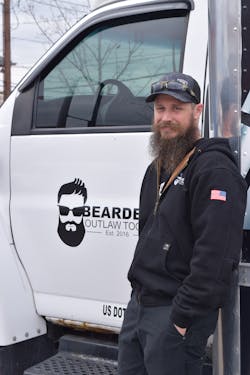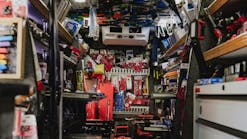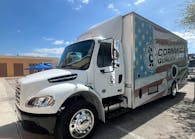He drives the streets of Louisville, helping solve problems and selling tools. Who is the one they call, “The Bearded Outlaw”?
“When I first started [this route] customers didn’t know who I was and always referred to me as “The bearded tool guy,” says independent distributor Joel Simmons. When Simmons decided to forge his own brand, he entertained calling the business ‘Outlaw Tools,’ while his wife preferred “The Bearded Outlaw.”
“I was thinking about it… but I’d have to keep my beard at that point,” Simmons says. “Finally, I [told her], ‘Ok, as long as you’re good with it.”
Here’s what else we know about this tool dealer:
The Bearded Outlaw used to be an aircraft mechanic. He lives outside of the city and has five kids. The Bearded Outlaw is actually a pretty laid-back dude. On the truck, he keeps a predictable schedule but isflexible. “Sometimes you’ve got to be a little lax, because to be accommodating can be better than making stops exactly on time,” he says.
Simmons has quite a few competitors around these parts, but he doesn’t worry, saying: “I’ve been so consistent that guys don’t really go and spend money with other dealers. I hear it all the time.”
His customers know him as “the slow, steady guy.” If his truck breaks down (which, given his track record and his current GMC Top Kit, it has, and it could) he’ll hop in his personal truck and deliver the goods.
Simmons has been stopping at some of his shops since he began selling tools six years ago. He has been an independent for three of those years. The all-Louisville route includes a number of body shops, big truck shops, and even a boat shop. Simmons also sees customers in construction equipment servicing and car dealerships. Monday and Tuesday of each week he stops to check in on some of his small, independent businesses.
No matter who the customer, Simmons always brings his personal approach. “I always go in (to the shop)… It’s more interesting to go talk to people than it is to sit in your truck and wait for them to come out. It’s just my personal preference.” Each stop is an opportunity to learn about the customers and their lives.
“They’re busy too,” he adds. “They appreciate that (me coming in); they don’t want to be harassed.” At one of his regular stops, a large Mercedes dealership, he’ll stop for a couple hours to talk shop and see what needs taking care of.
Selling strategies
Early in his selling career Simmons was fielding special requests from technicians looking for the right tool. When he first started business, working under a flag, he covered an area that already had plenty of established tool dealers, and he found this to be a good way to distinguish himself. Now Simmons has the reputation as a trustworthy resource, and he’s earned the relationships to back it up.
“It was really hard getting started,” Simmons says. “I was the guy who did the labor that no one else wanted to do. It paid off, but I spent a lot of time – hours – trying to track down miscellaneous stuff for guys late at night. I enjoy it… it’s just a challenge. It makes things a bit more exciting than strictly selling the same thing over and over.”
Finding specialty product is a way Simmons carves his niche. Another is by being the guy who knows “What’s new?”. This is true even beyond stocking product. Simmons sees some of the bigger trends happening in the industry; he pays attention to these trends and his customers’ businesses. He tries to stay informed so he can be that educator or resource for his diverse customer base.
“I’m across the board with everything,” Simmons says. “I do a lot of work with body shops because most tool guys don’t have the knowledge about body tools. So, you learn about that; those guys will spend some money if you have something they don’t have or it’s interesting or new. They’ve always had to have more tools than the average technician.”
Strategic inventory
Simmons’ truck is an oasis for customers. Looking through the shelves, one finds well-organized product categories and some surprises, too – like beard oil and gun sights.
“I’ve found there are a lot of guys who have the majority of what they need, but they might want something for convenience. That’s why I try to change it up and carry different, new stuff,” he says. “I just got an air horn because I know guys are going to love giving someone a hard time.”
Over the years Simmons had to refine his approach to inventory in order to focus on what works best for him. This means he does “a lot of smalls.” “It’s more action,” Simmons says, and he gets his money back quicker.
“I don’t even carry toolboxes; I just try to ship them direct if a guy wants one. When someone comes and spends $20 on the truck it just keeps things going. Makes it easier too, sometimes, rather than always having big purchases,” says Simmons. Carts are a popular buy, he says, because people like the mobility of the unit and the price.
Simmons doesn’t sell many large ticket items like large boxes, scan tools, etc. He loves selling (and sells a lot of) work carts, electrical testing equipment, TPMS equipment (small to mid-grade), small impacts, specialty tools, and body shop products.
Beyond product, the Louisville independent is big on education. He knows the value of educating customers, like on thee new 1234yf refrigerant for example. He prides himself on his research tools and equipment and his understanding of specific repair jobs.
“Knowledge is really key. At one point I got tired of dealing with [scan tools] because of the confusion,” says Simmons. “There were [mobile dealers] out there who would lie about what a scan tool could do and I’m honest about what it wouldn’t do… I like to understand how things work. I feel a responsibility – if I sell something – especially a three- or four-thousand-dollar item, to actually know a little bit about it. I like [to know], too.”
One of Simmons’ dealerships recently purchased ADAS calibration equipment. This customer goes around to body shops and everyone else who might want to lease it out, which provides a larger selling opportunity for this shop.
Finding the sweet spot between work and reward
About five years ago, as a new mobile dealer, Simmons was in an accident that totaled his tool truck. He walked away from it, but he says he learned from the experience. He’s still learning. For instance, he learned it’s not all about the truck and what’s inside; the most important aspect of this business is how he approaches each stop.
“It sounds simple, but it’s relationships and consistency,” says the mobile dealer. “[After the accident] we had a Dodge Durango and I put string in there, suction cups… I hung things from the window, I piled in the tools, and I drove around and sold out of that for like a month. When a technician saw me do that, they thought ‘Oh, he’s dedicated’. Consistency definitely won out.”
Fast forward to today. Simmons’ first stop on Tuesdays is at six in the morning and the last stop is 8 o’clock at night, with lunch on-the-go. This allows Simmons to wrap up by five on Friday and have the weekend with his family.
“Before [going independent] I was working nonstop… trying to get everybody… [trying to] get the piece of the pie and fight everything,” he says. Now he’s more interested in the making connections and making each day count.
“I don’t build my business off of sales; it’s built on relationships,” says Simmons. “That’s why it takes so long. Some guys want to joke around; some want to complain. But it makes it a lot more consistent as far as your long-term customers who pay. You don’t have to chase anyone down as much.” With this strategy Simmons says he could soon choose the shops he wanted, add new ones, and make his business more consistent. “It’s a lot less stress,” he says.
In the next few years, Simmons’ goal is to keep paying down investments, add product, and then see what happens. “I’ll try anything at least once and see how it works,” he says with a grin.
In this tough business, the most rewarding aspect for this mobile dealer are his customers. He is their tool supplier, sales support, educator, and neighbor.
“I think I’ve got more friends than my wife on Facebook now. It’s a great network to be in. All of those guys -- I’d bend over backwards for them.”
Every day, Simmons sees the challenges and struggles of his customers’ experience first-hand – from new technology to tech shortages and a low hourly wage. He anticipates a lot of changes to the industry in the next few years, and he wants to be there for the ride.
“I’ve had some customers do Uber on the side. And they make more money doing that than being technicians. [I think] there will be a resurgence in some of these independent shops because some of the younger guys are more computer and tech savvy,” Simmons says.
“If I get with these guys now, they will know me when they are the ones leading the area.”



